Michael J. Kramer's Blog, page 21
September 17, 2022
Mooning the World
 K.C. Houseman (John Bradley West), Jocinda Fowler (Halle Berry), and Brian Harper (Patrick Wilson) in Moonfall.
K.C. Houseman (John Bradley West), Jocinda Fowler (Halle Berry), and Brian Harper (Patrick Wilson) in Moonfall.I’ll walk you out in the morning dew my honey /
I guess it doesn’t really matter anyway
— Bonnie Dobson, “Morning Dew”
What a little moonlight can do.
— Harry M. Woods
The new Roland Emmerich film Moonfall, like so many of his films, could care less if you think it is good or not. The plot is so absurd, the dialogue so shoddy, the premise so ridiculous that the entire movie breaks free of all constraints. The film is wonderfully bad, even tasteless. It is maybe the worst yet by Emmerich, and hence the best yet.
Moonfall rifles (or better said lasers) through every low-budget, B-movie, half-baked, science-fiction fantasy of the end of the world Hollywood has ever concocted. Every disaster-film cliche, every goofy dream of a Hollywood apocalypse appears, then just as quickly disappears. You want flooding waters? Check. You want outer space alien attack? Check. You want mountains crumbling? Check. You want cities laid waste? Got that covered too. The weird cuts in the editing of the film exaggerate the hodge-podge effect. The whole film teeters on its bits and bytes, as if the pixels might fall apart at any moment. This film auto-destructs. Watch out! Have fun dying, humans!
Current events hover over the film—if one can call this incoherent joke a film and not just a series of scenes—like the moon itself, which hovers ever closer to the earth with each sequence of footage. It starts to look suspiciously like the alien ships in Emmerich’s Independence Day. Maybe an effective re-use of some old special effects files? Just as the Persian Gulf War haunted that film from 1996, and just as 9/11 informed The Day After Tomorrow in 2004, so too Moonfall gestures, with fabulous laziness, to contemporary dilemmas. In particular, it proposes the futility of humans to reckon fully with climate change.
Just as crucially, the film plays with the au courant yet time-honored theme of the truth-teller no one will hear. A feeling of shouting into the breeze, or in this case into the vacuum of space, in a world in which no one will listen, pervades the movie. This is jeremiad at its best. There is the feeling of an America gone berserk, a mood of both conspiracies good (we smarties are in the know about the actual truth of the moon: it’s a “megastructure”!) and conspiracies bad (this was all hidden by the government during the original moon landing in 1969, as Donald Southerland tells us from a wheel chair in a dark laboratory that itself looks like it might be on the dark side of the moon itself). There’s an air of “truthiness” and Trumpiness to the whole film. Which is why its carefree ride into the sunset, I mean the moon glow, I mean, er, the megastructure built by aliens to combat a malignant AI that looks like it made its way into the film from the cutting floor of the Matrix, is so wonderful. It gloriously outruns the sordid presidential term of 2016 to 2020 with outlandish absurdities and a frank lack of interest in quality.
Halle Berry and Patrick Wilson do their best with the awful dialogue to portray a bickering work couple reunited to save the day, but it is John Bradley West who steals the show as a bathetic scientist and mama’s boy who is convinced that the moon is actually indeed a “megastructure.” Humans, it turns out, have merely been launched like so much space junk into this larger galactic struggle, which has pulled the moon off its orbit and wreaks wonderfully bad special-effects havoc on cities around the globe. Berry and Wilson must save the day (and in a gratuitous subplot Wilson’s son, played by Charlie Plummer, and the husband of his ex-wife, played by Michael Peña, must do the same). It is West, however, who steals the show.
With every ridiculous line he is forced to recite, West almost winks with delight at the audience. Just as he did to a lesser extent as Samwell Tarly in Game of Thrones, in which he seemed to giggle at the silliness of the swords-and-spells story even as he played his part in it, so too in Moonfall West hams it up so wonderfully he almost breaks the fourth wall at times. The effect is a kind of emancipation. Disaster becomes a dream. The nightmare of contemporary times gets emptied of its terror and fear. Maybe us humans really are just the supporting cast in someone else’s epically farcical story of universal war and destruction. Let’s get over ourselves.
The moon, it turns out, is hollow. So too is this campy film. It doesn’t care a wit about being serious or smart or good or even convincing. Which makes it gloriously freeing, energizing and even, in a strange way, radically liberating. Maybe sometimes the end of the world can set you free.
September 9, 2022
Digital Humanities Outside the Center
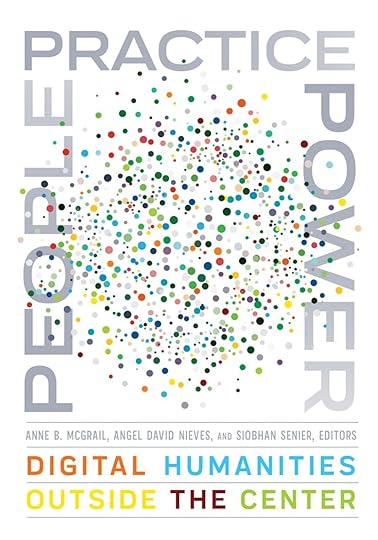 Kramer_People-Practice-Power-Digital-Humanities-Outside-the-Center-Review-AfterImage
Kramer_People-Practice-Power-Digital-Humanities-Outside-the-Center-Review-AfterImageAugust 31, 2022
Rovings
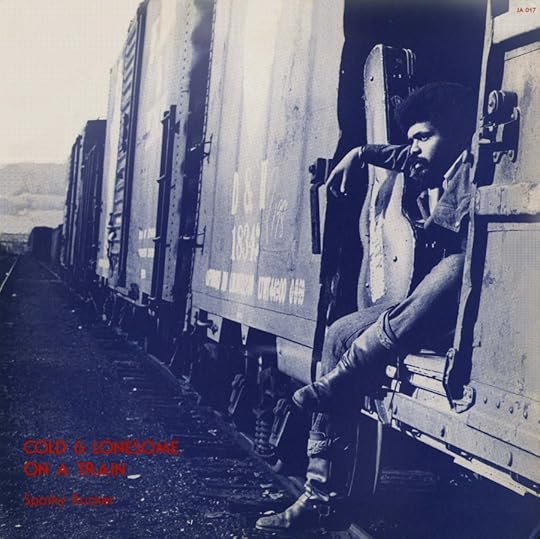 SoundsNo-No Boy, 1975Guided By Voices, Crystal Nuns Cathedral“Peter Kropotkin,” In Our Time, BBC Sounds“Walter Benjamin,” In Our Time, BBC SoundsMatthew Mullane, Hut VariationsMamman Sani,, La Musique Electronique du NigerBuell Kazee, Buell KazeeSparky Rucker, Cold and Lonesome on a TrainGinny Hawker & Kay Justice with Tracy Schwarz, Come All You Tenderhearted: Traditional Southern SingingGending Tari Dan Tembang, Heru Subeno, Reyog Ponorogo, Volume 3“Changüí!,” Afropop Worldwide, 11 August 2022Various Artists, Changüí: The Sound of GuantánamoNatural Information Society and the Bitchin Bajas, AutoimaginaryAmerican Music Theater, Harry Partch: Revelation in the Courthouse ParkMatthew Sitman and Sam Adler-Bell, “Christopher Lasch’s Critique of Progress, with Chris Lehman: What exactly did Christopher Lasch want?,” Know Your Enemy Podcast, Dissent, 11 August 2022 WordsMatthew Specter, “Realism’s Imperial Origins,” Dissent, Summer 2022 Tim Sommer, “In the Late ’70s, Teen Punks Ruled New York. These Are Their Stories.,” New York Times, 3 August 2022Bob Mehr, “Earl McGrath Was a Character. His Closet Was Filled With Rare Recordings,” New York Times, 12 July 2022Marcus J. Moore, “Revisiting the Pyramids’ ‘Avant-Garde African Jazz,’ Four Decades Later,” New York Times, 14 July 2022Kate Hutchinson, “‘Better Late Than Never’: How Brian Eno and David Byrne Finally Laid a Musical Ghost to Rest,” Guardian, 11 August 2022Benjamin Lapidus, Origins of Cuban Music and Dance: ChangüíOmari Weekes, “Mindful Mayhem: La Marr Jurelle Bruce on Madness, Black Expressive Culture, and Radical Compassion,” Bookforum, March/April/May 2022Jennifer Wilson, “Hegemony Changes Everything: Antonio Gramsci’s Theories of How the Rich Stay Rich,” Bookforum, March/April/May 2022Hermione Hoby, “Love, Labor, Loss: Laura Kipnis’s Field Report on Romance During the Pandemic,” Bookforum, March/April/May 2022Gene Seymour, “Sharpening Her Oyster Knife: The Ferociously Independent Zora Neale Hurston, Bookforum, March/April/May 2022Matthew Crain, “How Capitalism—Not a Few Bad Actors—Destroyed the Internet,” Boston Review, 3 August 2022Nina Fouilloux, “Listening to Geese: The Non-Human, Art, and The Possibilities of Global Thought (Part I),” JHIBlog, 4 July 2022, Part I & Part IIByrd McDaniel, “A New Age of Protest Music: Through online fan communities and digital platforms like TikTok, popular music is finding powerful new ways to shape everyday activism, protest, and resistance,” Boston Review, 22 June 2020Gia Kourlas, “What Does a Dancing Body Feel Like in Ukraine? ‘I Am a Gun.’,” New York Times, 24 August 2022Mimi Melnick and Robert A. Melnick, Manhole Covers“Walls”Modernism in Miniature @ Norton Simon MuseumCharley Friedman: Soundtracks for the Present Future @ Everson Museum of Art“Stages”Saint Joan @ MUCCC, 13 August 2022David Fulmer Performs at Charley Friedman: Soundtracks for the Present Future, Everson Museum of ArtJaimie Branch & Jason Nazary (Anteloper) @ ESS Gala, Sleeping Village, 4 October 2018 Jaimie Branch & Fred Lonberg Holm @ ESS, 18 July 2016Jaimie Branch, Josh Berman & Ben LaMar Gay @ ESS, 18 July 2016ScreensThomas Crow, Paul Mellon Lecture, “The Great Lost Look ca. 1969: Beyond Cultural Studies”Investigating Mahagonny, 31 May 2002Occupied, Netflix
Nuestro Changüí
Paul Westerberg: Miller Genuine Draft Craft Series Interview, 2007John Juta Leaños, Destinies ManifestAtlanta, Season 03
SoundsNo-No Boy, 1975Guided By Voices, Crystal Nuns Cathedral“Peter Kropotkin,” In Our Time, BBC Sounds“Walter Benjamin,” In Our Time, BBC SoundsMatthew Mullane, Hut VariationsMamman Sani,, La Musique Electronique du NigerBuell Kazee, Buell KazeeSparky Rucker, Cold and Lonesome on a TrainGinny Hawker & Kay Justice with Tracy Schwarz, Come All You Tenderhearted: Traditional Southern SingingGending Tari Dan Tembang, Heru Subeno, Reyog Ponorogo, Volume 3“Changüí!,” Afropop Worldwide, 11 August 2022Various Artists, Changüí: The Sound of GuantánamoNatural Information Society and the Bitchin Bajas, AutoimaginaryAmerican Music Theater, Harry Partch: Revelation in the Courthouse ParkMatthew Sitman and Sam Adler-Bell, “Christopher Lasch’s Critique of Progress, with Chris Lehman: What exactly did Christopher Lasch want?,” Know Your Enemy Podcast, Dissent, 11 August 2022 WordsMatthew Specter, “Realism’s Imperial Origins,” Dissent, Summer 2022 Tim Sommer, “In the Late ’70s, Teen Punks Ruled New York. These Are Their Stories.,” New York Times, 3 August 2022Bob Mehr, “Earl McGrath Was a Character. His Closet Was Filled With Rare Recordings,” New York Times, 12 July 2022Marcus J. Moore, “Revisiting the Pyramids’ ‘Avant-Garde African Jazz,’ Four Decades Later,” New York Times, 14 July 2022Kate Hutchinson, “‘Better Late Than Never’: How Brian Eno and David Byrne Finally Laid a Musical Ghost to Rest,” Guardian, 11 August 2022Benjamin Lapidus, Origins of Cuban Music and Dance: ChangüíOmari Weekes, “Mindful Mayhem: La Marr Jurelle Bruce on Madness, Black Expressive Culture, and Radical Compassion,” Bookforum, March/April/May 2022Jennifer Wilson, “Hegemony Changes Everything: Antonio Gramsci’s Theories of How the Rich Stay Rich,” Bookforum, March/April/May 2022Hermione Hoby, “Love, Labor, Loss: Laura Kipnis’s Field Report on Romance During the Pandemic,” Bookforum, March/April/May 2022Gene Seymour, “Sharpening Her Oyster Knife: The Ferociously Independent Zora Neale Hurston, Bookforum, March/April/May 2022Matthew Crain, “How Capitalism—Not a Few Bad Actors—Destroyed the Internet,” Boston Review, 3 August 2022Nina Fouilloux, “Listening to Geese: The Non-Human, Art, and The Possibilities of Global Thought (Part I),” JHIBlog, 4 July 2022, Part I & Part IIByrd McDaniel, “A New Age of Protest Music: Through online fan communities and digital platforms like TikTok, popular music is finding powerful new ways to shape everyday activism, protest, and resistance,” Boston Review, 22 June 2020Gia Kourlas, “What Does a Dancing Body Feel Like in Ukraine? ‘I Am a Gun.’,” New York Times, 24 August 2022Mimi Melnick and Robert A. Melnick, Manhole Covers“Walls”Modernism in Miniature @ Norton Simon MuseumCharley Friedman: Soundtracks for the Present Future @ Everson Museum of Art“Stages”Saint Joan @ MUCCC, 13 August 2022David Fulmer Performs at Charley Friedman: Soundtracks for the Present Future, Everson Museum of ArtJaimie Branch & Jason Nazary (Anteloper) @ ESS Gala, Sleeping Village, 4 October 2018 Jaimie Branch & Fred Lonberg Holm @ ESS, 18 July 2016Jaimie Branch, Josh Berman & Ben LaMar Gay @ ESS, 18 July 2016ScreensThomas Crow, Paul Mellon Lecture, “The Great Lost Look ca. 1969: Beyond Cultural Studies”Investigating Mahagonny, 31 May 2002Occupied, Netflix
Nuestro Changüí
Paul Westerberg: Miller Genuine Draft Craft Series Interview, 2007John Juta Leaños, Destinies ManifestAtlanta, Season 03
August 18, 2022
The Golden Toad
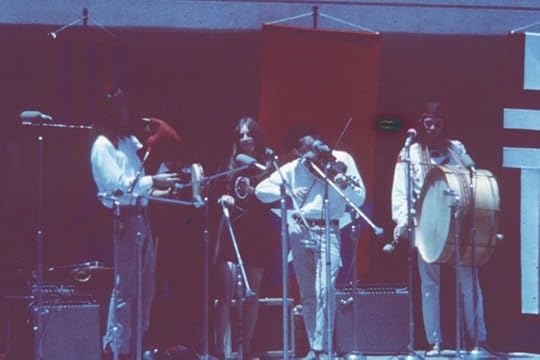
A very rare recording of the much-beloved but rarely-heard sixties Renaissance Faire band the Golden Toad at the 1968 Berkeley Folk Music Festival. That’s MC Sam Hinton interacting with the band a bit. Members included Bob Thomas, Will Spires, Don Brown, Rob Patterson, and Lisa Phillips. For more see Rachel Lee Rubin’s book Well Met: Renaissance Faires and the American Counterculture and Corry Arnold’s Hooterollin’ Around blog entry about a 19 February 1969 appearance at the Fillmore West with the Grateful Dead.
August 15, 2022
Is Punk Rock Intellectual History?
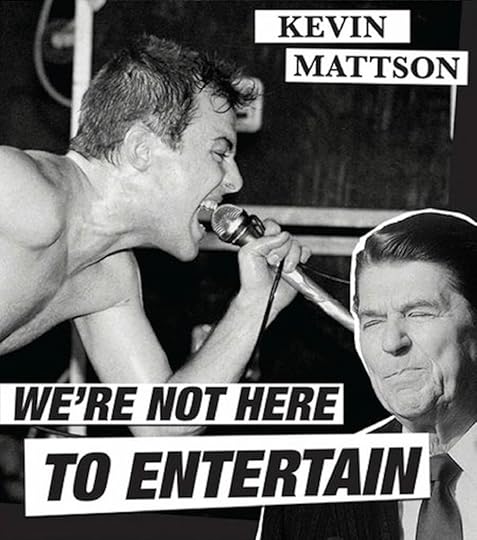
Is punk rock intellectual history?
You can decide for yourself by reading the book roundtable on Kevin Mattson’s We’re Not Here to Entertain: Punk Rock, Ronald Reagan, and the Real Culture War of 1980s America, published over the next two weeks at the Society for US Intellectual History Blog and edited with help from students in the Fall 2021 course The American Mind: What Were They Thinking?—US Intellectual History and Digital Editing Practicum, offered by the SUNY Brockport Department of History (the Fall 2022 course still has a few open seats in it for interested students at SUNY Brockport!).
Students worked as editorial assistants, helping nine writers develop their essays. The course combines deep historical inquiry with professional skills development. Students gained skills in historical analysis, research, editing, multimedia publication, and project management. Among the responses, be sure to check out the digital Storymap of punk rock in the early 1980s created by History graduate student Glenn Dowdle.
Over the coming year, I’ll be developing a new project, the US Intellectual History Review. Based at SUNY Brockport’s History Department, it will publish a wide range of features in US intellectual history—very broadly conceived, for both academic and general audiences—at an open-source, online platform.
Book Roundtable: Kevin Mattson’s We’re Not Here to EntertainAugust 10, 2022
Syllabus—The American Mind
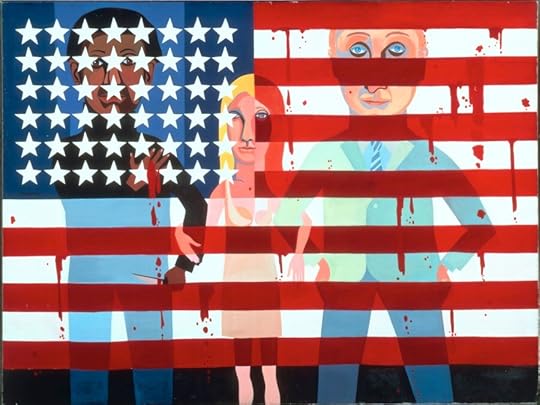 Faith Ringgold, The Flag Is Bleeding, The American People Series 18, 1967.Overview
Faith Ringgold, The Flag Is Bleeding, The American People Series 18, 1967.OverviewHow have Americans thought about themselves and their world? How do ideas matter to history? Is there such a thing as “the American Mind”? What happens when Americans go “out of their minds”? How have Americans contested who is part of the American Mind? We explore a diversity of past voices that remain relevant today through primary sources and historical scholarship. Students read selected sources and studies in US intellectual history, engage in extensive discussion, and develop a set of analytic writing assignments. Additionally, to develop employable, professional skills, students also complete an editorial assistantship in the course by working on a book roundtable for the online US Intellectual History Review. In the process, they acquire editing, research, project management, and digital production skills. No previous editorial or digital experience required. As part of their editorial assistantship, students complete a “digital sidebar” project (timeline, map, playlist, annotated bibliography, scholar interview, primary source annotation, short book review, or other component for the book roundtable). 500-level students complete one additional short assignment that links the course to the development of their potential graduate capstone thesis.
Required MaterialsThe books may be purchased at the SUNY Brockport bookstore or at an online bookseller. Be sure to purchase the proper editions. Books are also on reserve at Drake Library and can be obtained through Interlibrary Loan as another option.
Jennifer Ratner-Rosenhagen, The Ideas That Made America: A Brief History (New York: Oxford University Press, 2019) **focus for USIH Review book roundtable**Philip J. Deloria, Indians in Unexpected Places (Lawrence: University Press of Kansas, 2004)Andrew Hartman, A War for the Soul of America, Second Edition: A History of the Culture Wars (Chicago: University of Chicago Press, 2019)Keeanga-Yamahtta Taylor, ed., How We Get Free: Black Feminism and the Combahee River Collective (Chicago: Haymarket Books, 2012)Additional essays, readings, films, and multimedia materials on course websiteAt Library Reserves:In addition to the books above, the following primary source readers are not required, but are available on reserve at the Drake Library.
David A. Hollinger and Charles Capper, eds., The American Intellectual Tradition, Volume I: 1630 to 1865, 7th editionDavid A. Hollinger and Charles Capper, eds. The American Intellectual Tradition, Volume II: 1865 to the Present, 7th editionMeetings and Readings ScheduleThe instructor may adjust the meetings schedule as needed during the term, but will give clear instructions about any changes.
Week 01 — Unit 01: What Were They Thinking?Monday, 08/29: Introductions
Wednesday, 08/31: What Is Intellectual History, Anyway?
Required Materials:
Peter Gordon, “What is Intellectual History? A frankly partisan introduction to a frequently misunderstood field,” unpublished manuscript, 2012Brandon R. Byrd, “The Rise of African American Intellectual History,” Modern Intellectual History (2020), 1–32Optional:“Brandon R. Byrd—Redefining Intellectual History,” Fields of the Future Podcast“Brandon R. Byrd on African American Intellectual History,” AHR PodcastWeek 02 — Unit 02: Surveying US Intellectual HistoryMonday, 09/05: No Class, Labor Day
Wednesday, 09/07: Ratner-Rosenhagen, Introduction, Ch 1, 1-29
Week 03 — Surveying US Intellectual HistoryMonday, 09/12: Ratner-Rosenhagen, Ch 2, 30-50
Wednesday, 09/14: Ratner-Rosenhagen, Ch 3, 51-74
Week 04 — Surveying US Intellectual HistoryMonday, 09/19: Ratner-Rosenhagen, Ch 4, 75-96
Wednesday, 09/21: Ratner-Rosenhagen, Ch 5, 97-115
Week 05 — Surveying US Intellectual HistoryMonday, 09/26: Ratner-Rosenhagen, Ch 6, 116-132
Wednesday, 09/28: Ratner-Rosenhagen, Ch 7, 133-151
Week 06 — Surveying US Intellectual HistoryMonday, 10/03: Ratner-Rosenhagen, Ch 8, Epilogue, 152-180
Wednesday, 10/05: Digital Editing Workshop
Week 07 — Unit 03: Indians in Unexpected PlacesMonday, 10/10: Deloria, Introduction, Violence, 1-51
Wednesday, 10/12: Deloria, Representation, 52-108
Week 08 — Indians in Unexpected PlacesMonday, 10/17: No Class
Wednesday, 10/19: Deloria, Athletics, 109-135
Week 09 — Indians in Unexpected PlacesMonday, 10/24: Deloria, Technology, 136-182
Wednesday, 10/26: Deloria, Music, Conclusion, 183-224
Week 10 — Unit 04: Black Feminism and the Combahee River CollectiveMonday, 10/31: Introduction, The Combahee River Collective Statement
Wednesday, 11/02: Interviews and Comments: Taylor, Barbara Smith, Beverly Smith, Demita Frazier, Alicia Garza
Week 11 — Unit 05: The Examined LifeMonday, 11/07: The Examined Life, dir. Astra Taylor (2006), first half
Wednesday, 11/09: The Examined Life, dir. Astra Taylor (2006), second half
Week 12 — Unit 06: A War for the Soul of AmericaMonday, 11/14: Digital Editing Workshop
Wednesday, 11/16: Hartman, Introduction, Ch 1, 1-37
Week 13 — A War for the Soul of AmericaMonday, 11/21: Hartman, Ch 2, 3, 38-101
Wednesday, 11/23: No Class, Thanksgiving Break
Week 14 — A War for the Soul of AmericaMonday, 11/28: Hartman, Ch 4, 5, 102-170
Wednesday, 11/30: Hartman, Ch 6, 7, 171-221
Week 15 — A War for the Soul of AmericaMonday, 12/05: Hartman, Ch 8, 9, Conclusion, 222-304
Wednesday, 12/07: Closing Discussion—So, What Were They Thinking?
Assignments ScheduleThe instructor may adjust the assignments schedule as needed during the term, but will give clear instructions about any changes.
Wednesday, 09/07: Assignment 01—Student Introduction and Byrd Essay One-Paragraph Analysis
Monday, 09/19: Assignment 02—Contact Roundtable Writer
Friday, 10/07: Assignment 03—The Primary Source That Made American Intellectual History Interpretive Essay
Friday, 10/21: Assignment 04—Interpretive Essay Revisions
Friday, 11/04: Assignment 05—Digital Sidebar Proposal/Digital Editing Update Report
Friday, 12/16: Final—Digital Sidebar and Interpretive Digital Sidebar Essay
Friday, 12/16: 500-Level Students—Connecting Course to Potential Capstone Thesis Short Essay
Evaluation CriteriaEvaluations are never a judgment of you as a person, but rather they are meant to help you assess how you are processing material in the course and translating it into historical interpretation and understanding. We are working on college-level skills here and they take practice. History is a craft, and like any craft you must practice it to improve your abilities. Take advantage of the assignments and comments from professor to improve your capacities to analyze, communicate, write well, and express historical understanding. These skills will help you wherever you go and whatever you do in the future.
Assignment 01—Student Introduction and Byrd Essay One-Paragraph Analysis = 10%Assignment 02—Contact Roundtable Writer = 10%Assignment 03—The Primary Source That Made American Intellectual History Interpretive Essay = 15%Assignment 04—Interpretive Essay Revisions = 15%Assignment 05—Digital Sidebar Proposal/Digital Editing Update Report = 15%Final—Digital Sidebar and Interpretive Digital Sidebar Essay (500-Level Students—Connecting Course to Potential Capstone Thesis Short Essay = 5 of 25%) = 25%Attendance and Participation = 10%At least one constructive comment per class = full credit; occasional constructive comments = most credit; attentive presence = some credit.What Makes for Good Work?Evaluation of assignments will be based on the following rubric:
Argument – presence of an articulated argument that makes an evidence-based claim and expresses the significance of that claimEvidence – presence of specific evidence from primary sources to support the argumentArgumentation – presence of convincingly connection between evidence and argument, which is to say effective explanation of the evidence that links its details to the larger argument and its sub-arguments with logic and precisionContextualization – presence of contextualization, which is to say an accurate portrayal of historical contexts in which evidence appearedStyle – presence of logical flow of reasoning and grace of prose, including:an effective introduction that hooks the reader with originality and states the argument of the assignment and its significanceclear topic sentences that provide sub-arguments and their significance in relation to the overall argumenteffective transitions between paragraphsa compelling conclusion that restates argument and adds a final pointaccurate phrasing and word choiceuse of active rather than passive voice sentence constructionsDigital sidebar – effective design and use of digital toolGrading StandardsRemember to honor the Academic Honesty Policy at Brockport, including no plagiarism. Confused about what constitutes plagiarism? Don’t hesitate to ask your instructor. Also, as a side note, grades evaluate specific work in a class. They are never a judgment of you as a person. I value and respect all of you no matter what grade you receive. Grades are just a way to register your development in your studies.
A-level work is outstanding and reflects a student’s:
regular attendance, timely preparation, and on-time submission of assignmentsthorough understanding of required course materialinsightful, constructive, respectful and regular participation in class discussionclear, compelling, and well-written assignments that includea credible argument with some originalityargument supported by relevant, accurate and complete evidenceintegration of argument and evidence in an insightful analysisexcellent organization: introduction, coherent paragraphs, smooth transitions, conclusionsophisticated prose free of spelling and grammatical errorscorrect page formatting when relevantexcellent formatting of footnotes or other form of required documentationB-level work is good, but with minor problems in one or more areas
C-level work is acceptable, but with minor problems in several areas or major problems in at least one area
D-level work is poor, with major problems in more than one area
E-level work is unacceptable, failing to meet basic course requirements and/or standards of academic integrity/honesty
Attendance PolicyStudents are allowed **three** absences for the semester, no questions asked, no need for doctor’s note. These include absences for any reason. Each additional absence may lower your grade at the instructor’s discretion. More than five absences are grounds for a failing grade in the course. If you have medical or other issues beyond the three absences, please communicate clearly, as soon as possible, about your situation so that we can come up with a reasonable plan for completing the class successfully. Please contact the instructor if you have questions about the attendance policy.
Covid update: Given the continued pandemic, please if you feel sick with symptoms, stay home, speak with Hazen Health Center or your doctor, and get tested. I will work with you to remain caught up on the course.
Academic Honesty PolicyAcademic dishonesty, particularly in the form of plagiarism, will result in failed assignments, possible course failure, official reporting, and potential expulsion from Brockport. The Brockport Academic Honesty policy applies to all work in this course. To be certain about its stipulations, consult it on the College website. If you have additional questions about the Academic Honesty policy, please consult the instructor.
AdviceCitation: Using Chicago Manual of StyleThe goals of citation are to allow the reader to track back your evidence to its original source, primary or secondary, and to give credit where it is due to other people if you use their ideas. But, you may ask, Professor Kramer, why is all the formatting so seemingly random and arcane?! Because, well, it is (or I find it that way)! To do it accurately is to stay honest to the ideas that scholarship and writing requires careful, error-free, empirical work, but you can always go back to the key idea of a citation: it allows your reader to go back and inspect the evidence you are using. It’s like a trail of breadcrumbs back to what you used to develop an interpretation or argument and it allows you to distinguish between your original work and words or ideas you are borrowing from someone else.
1. There is a nice, quick overview of citation from the Chicago Manual of Style Shop Talk website. It includes lots of information and a pdf of examples.
2. For additional, helpful guidelines, visit the Drake Library’s Chicago Manual of Style page.
3. You can access the real deal and go right to the source—the 17th edition of the Chicago Manual of Style—at the Drake Library Reserve Desk.
Writing ConsultationWriting Tutors are available through the Academic Success Center and are always helpful at any stage of writing. Don’t hesitate to consult with someone! Be sure to show them the assignment prompt and syllabus guidelines for good work in the course.
Research ConsultationThe librarians at Drake Memorial Library are an incredible resource. You can consult with them remotely or in person. To schedule a meeting, go right to the front desk at Drake or visit the Library website.
Additional InformationDisabilities and AccommodationsAs the father of a child who is neuroatypical, Professor Kramer recognizes that students may require accommodations to learn effectively. In accord with the Americans with Disabilities Act and Brockport Faculty Senate legislation, students with documented disabilities may be entitled to specific accommodations. SUNY Brockport is committed to fostering an optimal learning environment by applying current principles and practices of equity, diversity, and inclusion. If you are a student with a disability and want to utilize academic accommodations, you must register with Student Accessibility Services (SAS) to obtain an official accommodation letter which must be submitted to faculty for accommodation implementation. If you think you have a disability, you may want to meet with SAS to learn about related resources. You can find out more about Student Accessibility Services on the SAS website by contacting SAS via at sasoffice@brockport.edu or (585) 395-5409. Students, faculty, staff, and SAS work together to create an inclusive learning environment. As always, feel free to contact the instructor with any questions.
Discrimination and Harassment PoliciesSex and gender discrimination, including sexual harassment, are prohibited in educational programs and activities, including classes. Title IX legislation and College policy require the College to provide sex and gender equity in all areas of campus life. If you or someone you know has experienced sex or gender discrimination, sexual harassment, sexual assault, intimate partner violence, or stalking, we encourage you to seek assistance and to report the incident through these resources. Confidential assistance is available on campus at Hazen Center for Integrated Care and RESTORE. Faculty are classified as mandatory reporters and thus cannot maintain confidentiality under Title IX and will need to share information with the Title IX & College Compliance Officer. For these and other policies governing campus life, please visit the College-Wide Student Policies webpage.
Statement of Equity and Open CommunicationWe recognize that each class we teach is composed of diverse populations and are aware of and attentive to inequities of experience based on social identities including but not limited to race, class, assigned gender, gender identity, sexuality, geographical background, language background, religion, disability, age, and nationality. This classroom operates on a model of equity and partnership, in which we expect and appreciate diverse perspectives and ideas. If anyone is experiencing exclusion, intentional or unintentional aggression, silencing, or any other form of oppression, I encourage open communication with myself and/or the class as a whole.
Disruptive Student BehaviorsSUNY Brockport’s procedures for dealing with students who are disruptive in class can be found here.
Emergency Alert SystemIn case of emergency, the Emergency Alert System at The College at Brockport will be activated. Students are encouraged to maintain updated contact information using the link on the College’s Emergency Information website. Included on the website is detailed information about the College’s emergency operations plan, classroom emergency preparedness, evacuation procedures, emergency numbers, and safety videos. In addition, students are encouraged to familiarize themselves with the Emergency Procedures posted in classrooms, halls, and buildings and all college facilities.
Learning GoalsThe study of history is essential. By exploring how our world came to be, the study of history fosters the critical knowledge, breadth of perspective, intellectual growth, and communication and problem-solving skills that will help you lead purposeful lives, exercise responsible citizenship, and achieve career success.
Course Learning GoalsIn this upper-level history course, students have the opportunity to learn about:
The field of intellectual history as part of the historical discipline.Historical facts concerning US history.Historical interpretations concerning US history.How history relates to the present.How to think, write about, and discuss ideas about the past and present.How to notice and analyze change and continuity over time.How to notice and analyze structures of power, how they have developed over time, and why they have.How to handle historical complexity through close analysis, paraphrasing, and interpretive questioning.How others have interpreted and debated the past (historiography).How to frame your own historical questions.How to develop close, accurate, compelling interpretations of historical evidence yourself.How to improve your skills of developing a historical narrative.How to use evidence to develop a historical thesis, an argument-driven, evidence-based historical narrative.How to paraphrase effectively.How to use source citation using Chicago Manual of Style effectively and accurately.How to connect your historical inquiry to useful, employable professional skills (editing, research, project management, writing, and digital publishing).History Department Learning GoalsArticulate a thesis (a response to a historical problem).Advance in logical sequence principal arguments in defense of a historical thesis.Provide relevant evidence drawn from the evaluation of primary and/or secondary sources that supports the primary arguments in defense of a historical thesis.Evaluate the significance of a historical thesis by relating it to a broader field of historical knowledge.Express themselves clearly in writing that forwards a historical analysis.Use disciplinary standards (Chicago Style) of documentation when referencing historical sources.Students will identify, analyze, and evaluate arguments as they appear in their own and others’ work.Students will write and reflect on the writing conventions of the disciplinary area, with multiple opportunities for feedback and revision or multiple opportunities for feedback.Students will demonstrate understanding of the methods social scientists use to explore social phenomena, including observation, hypothesis development, measurement and data collection, experimentation, evaluation of evidence, and employment of interpretive analysis.Students will demonstrate knowledge of major concepts, models and issues of history.Students will develop proficiency in oral discourse and evaluate an oral presentation according to established criteria.General Education Learning GoalsStudents will identify, analyze, and evaluate arguments as they appear in their own and others’ work.Students will write a short paper or report reflecting the writing conventions of the disciplinary area, with at least one opportunity for feedback and revision or multiple opportunities for feedback.Syllabus—Modern America
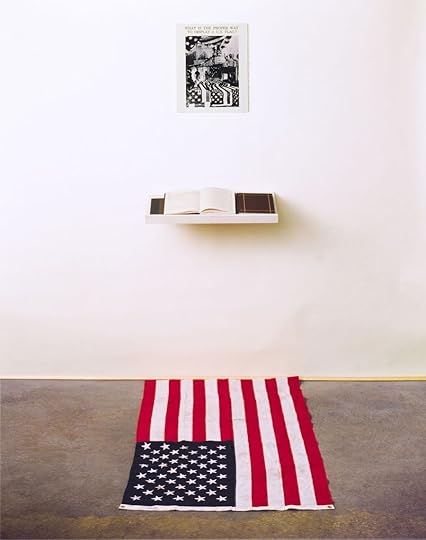 Dread Scott, What is the Proper Way to Display a US Flag?, an installation for audience participation, 1989.Overview
Dread Scott, What is the Proper Way to Display a US Flag?, an installation for audience participation, 1989.OverviewModern America provides explores the history of the United States since the Civil War. Through interactive multimedia lectures, readings, discussion, and writing, students analyze the struggles of diverse communities over wealth, rights, and authority. How did the historical experiences of a wide range of Americans shape systems of power, patterns of resistance, socio-political identities, and cultural and intellectual life during a period that saw the emergence of the US as a global power? As we study the history of modern America, the course also develops skills in critical close reading, historical thinking and contextualization, oral communication, project management, and effective analytic writing.
Required Course MaterialEric Foner, Give Me Liberty! An American History Volume 2 Brief Sixth Edition. New York: WW Norton & Company, 2020.Eric Foner, ed., Voices of Freedom: A Documentary History Volume 2 Sixth Edition. New York: WW Norton & Company, 2020.Additional materials on course website.The two books are available at SUNY Brockport campus bookstore, bookseller of your own choice, and on reserve at Drake Library. You can also try to obtain the books by Interlibrary Loan as an option. Print or electronic versions are both acceptable to purchase, but please be able to bring your copies of the books (whether a book or on laptop, tablet, or smartphone) to class on occasion. Be sure to purchase the correct editions of the two books.
Meetings ScheduleThe instructor may adjust the meetings schedule as needed during the term, but will give clear instructions about any changes.
Week 01 — Planting A Flag in Modern AmericaMonday, 08/29: Planting a Flag in Modern America—Introduction
Wednesday, 08/31: Planting a Flag in Modern America—Introduction
Friday, 09/02: Library Introduction with Librarian Pam O’Sullivan. Meet at Drake Library.
Week 02 — Is Reconstruction Unfinished? 1865-1877Monday, 09/05: No Class, Labor Day
Wednesday, 09/07: What Was Reconstruction?
Friday, 09/09: Is Reconstruction Unfinished?
Week 03 — America’s Second Industrial Revolution: The “Gilded Age,” 1877-1890Monday, 09/12: The Hog Squeal of the Universe—Corporate Capitalism Arrives
Wednesday, 09/14: Where Does the Weekend Come From? Americans Respond to the Rise of Corporate Capitalism
Friday, 09/16: Discussion—Practicing Citation
Week 04 — Freedom’s Boundaries, At Home and Abroad, 1865-1900Monday, 09/19: From US Settler Colonialism to Formal Empire
Wednesday, 09/21: From US Settler Colonialism to Formal Empire
Friday, 09/23: The Nadir: Jim Crow and Discussion
Week 05 — The Progressive Era, 1900-1916Monday, 09/26: Did the Progressive Era Make Progress? Part 1
Wednesday, 09/28: Did the Progressive Era Make Progress? Part 2
Friday, 09/30: No Class—Catch Your Breath
Week 06 —The Great War and Its Aftermath, 1916-1920Monday, 10/03: Making the World Safe for Democracy? WWI
Wednesday, 10/05: Making the Postwar World Safe for Democracy? The Aftermath
Friday, 10/07: Discussion
Week 07 — The “Roaring” Twenties, 1920-1929Monday, 10/10: What Made the “Roaring” Twenties Roaring?
Wednesday, 10/12: What Made the “Roaring” Twenties Roaring?
Friday, 10/14: Discussion
Week 08 — The New Deal and WWII, 1929-1945Monday, 10/17: No Class
Wednesday, 10/19: From Roaring Twenties to Great Depression
Friday, 10/21: FDR’s New Deal and the Making of “Modern” Liberalism
Week 09 — The New Deal and WWII, 1929-1945Monday, 10/24: FDR’s New Deal and the Making of “Modern” Liberalism Continued
Wednesday, 10/26: Was World War II the Actual New Deal?
Friday, 10/28: Discussion—Debating Modern Liberalism: The American Century or Century of the Common Man?
Week 10 — Abundance and Its Discontents, 1945-1990Monday, 10/31: Cold War Containments, 1945-1960
Wednesday, 11/02: Cold War Containments, 1945-1960 Part 2
Friday, 11/04: Cold War Rebellions, 1945-1960
Week 11 — Abundance and Its Discontents, 1945-1990Monday, 11/07: Cold War Rebellions, 1945-1960 Part 2
Wednesday, 11/09: Reconstruction Redux? The Modern African American Civil Rights Movement
Friday, 11/11: Reconstruction Redux? The Modern African American Civil Rights Movement Part 2
Week 12 — Abundance and Its Discontents, 1945-1990Monday, 11/14: The Great Society? New Frontiers, New Lefts, New Rights, and the Quagmire of the Vietnam War, Part 1
Wednesday, 11/16: The Great Society? New Frontiers, New Lefts, New Rights, and the Quagmire of the Vietnam War, Part 2
Friday, 11/18: Discussion—Interpretive Timelines Assignment
Week 13 — Thanksgiving WeekMonday, 11/21: Online lecture—R-E-S-P-E-C-T and the Social Movements of the Sixties,” US History Scene
Week 14 — Abundance and Its Discontents, 1945-1990Monday, 11/28: Disco Demolition—The 1970s From Watergate to the Malaise Speech
Wednesday, 11/30: The Reagan Revolution—Modern Conservatism as Revolution and the Rise of the New Right
Friday, 12/02: An Era of Uncertainty: The 1990s
Week 15 — Is America Modern Yet? 1990-2020Monday, 12/05: The End of the American Century? The 2000 Election, 9/11, the War on Terror, and the 2008 Great Recession
Wednesday, 12/07: Make America Great Again? The Obama and Trump Eras
Friday, 12/09: Closing Discussion—Is America Modern Yet?
Readings ScheduleThe instructor may adjust the readings schedule as needed during the term, but will give clear instructions about any changes.
Week 01 — Planting A Flag in Modern AmericaDue Wednesday, 08/31:
Give Me Liberty!, Table of Contents,Preface, xix-xxviiiWeek 02 — Is Reconstruction Unfinished? 1865-1877Due Wednesday, 09/07:
Give Me Liberty!, Chapter 15, “What Is Freedom?”: Reconstruction, 1865-1877, 437-468Voices of Freedom, Chapter 15, read all documentsMartin Pengelly, “A disputed election, a constitutional crisis, polarisation…welcome to 1876” (interview with Eric Foner), The Guardian, 23 August 2020Optional Brockport Faculty Reading: John Daly, “The Southern Civil War 1865-1877: When Did the Civil War End?”Week 03 — America’s Second Industrial Revolution: The “Gilded Age,” 1877-1890Due Wednesday, 09/14:
Give Me Liberty!, Chapter 16, “‘America’s Gilded Age, 1870-1890,” 447-505Voices of Freedom, Chapter 16, 28-52, pay particular attention to Carnegie (104), Second Declaration of Independence (106), George (107), and Saum Song Bo (109, especially in relation to Douglass, “The Composite Nation”)Week 04 — Freedom’s Boundaries, At Home and Abroad, 1865-1900Due Wednesday, 09/21:
Give Me Liberty!, Chapter 16, “America’s Gilded Age, 1870-1890,” The Subjugation of the Plains Indians-Myth, Reality, and the Wild West, pp. 493-501Give Me Liberty!, Chapter 17, “Freedom’s Boundaries, at Home and Abroad, 1890-1900,” 508-539Voices of Freedom, Chapter 17, 53-74, pay particular attention to Du Bois (113), Wells (114), and Aquinaldo (117)Hopi Petition Asking for Title to Their Lands (1894), scroll down to read the transcription, especially p. 7Elk v. Wilkins, 112 U.S. 94 (1884), Syllabus (full case optional if you are interested)Week 05 — The Progressive Era, 1900-1916Due Wednesday, 09/28:
Give Me Liberty!, Chapter 18, “Chapter 18: The Progressive Era, 1900-1916,” 540-571Voices of Freedom, Chapter 18, pay particular attention to Ryan (120), Sanger (122), and Wilson (124)Optional: Various Authors, “Suffrage at 100,” New York Times, 2019-2020, https://www.nytimes.com/spotlight/wom... Brockport Faculty Listening: Elizabeth Garner Masarik, “100 Years of Woman Suffrage,” Dig! A History Podcast, 5 January 2020Week 06 —The Great War and Its Aftermath, 1916-1920Due Wednesday, 10/05:
Give Me Liberty!, Chapter 19: Safe for Democracy: The United States and World War I, 1916-1920, 572-605Voices of Freedom, Chapter 19, 104-133, pay particular attention to Bourne (106, in relation to Douglass, “The Composite Nation)Week 07 — The “Roaring” Twenties, 1920-1929Due Wednesday, 10/12:
Give Me Liberty!, Chapter 20, 1920-1932: From Business Culture to Great Depression in the “Roaring” Twenties, 606-636Voices of Freedom, Chapter 20, 134-159, pay particular attention to Congress Debates Immigration (138) and Hill and Kelley Debate the ERA (1922)Week 08 — The New Deal and WWII, 1929-1945Due Wednesday, 10/19:
Give Me Liberty!, Chapter 21: The New Deal, 1932-1940, 637-669Voices of Freedom, Chapter 21, 160-186, pay particular attention to FDR (145), Hoover (146), Hill on Indian New Deal (148)Optional Brockport Faculty Reading: Anne S. Macpherson, “Birth of the U.S. Colonial Minimum Wage: The Struggle over the Fair Labor Standards Act in Puerto Rico, 1938– 1941,” Journal of American History 104, 3 (December 2017), 656-680Week 09 — The New Deal and WWII, 1929-1945Due Wednesday, 10/26:
Give Me Liberty!, Chapter 22: Fighting for the Four Freedoms: World War II, 1941-1945, 670-704Voices of Freedom, Chapter 22, 187-207, pay particular attention to FDR on the Four Freedoms (150), WWII and Mexican Americans (155), and Jackson, Dissent in Korematsu (157), Luce, American Century (152) and Wallace, Century of the Common Man (153)Week 10 — Abundance and Its Discontents, 1945-1990Due Wednesday, 11/02:
Give Me Liberty!, Chapter 23: The United States and the Cold War, 1945-1953, 705-720Voices of Freedom, Chapter 23, 208-239, pay particular attention to The Truman Doctrine (159) and Lippmann, A Critique of Containment (161)Optional Brockport Faculty Reading: Bruce Leslie (and John Halsey), “A College Upon a Hill: Exceptionalism & American Higher Education,” in Marks of Distinction: American Exceptionalism Revisited, ed. Dale Carter (Aarhus, Denmark: Aarhus University Press, 2001), 197-228Week 11 — Abundance and Its Discontents, 1945-1990Due Wednesday, 11/09:
Give Me Liberty!, Chapter 24: An Affluent Society, 1953-1960, 734-750Voices of Freedom, Chapter 24, pay particular attention to Mills (171)Week 12 — Abundance and Its Discontents, 1945-1990Due Wednesday, 11/16:
Give Me Liberty!, Chapter 25: The Sixties, 1960-1968, 766-802Optional: Keisha N. Blain, “Fannie Lou Hamer’s Dauntless Fight for Black Americans’ Right to Vote,” Smithsonian Magazine, 20 August 2020Voices of Freedom, Chapter 25, 264-297, pay particular attention to Goldwater (1964), Port Huron Statement (178)Optional Brockport Faculty Reading: Meredith Roman, “The Black Panther Party and the Struggle for Human Rights,” Spectrum: A Journal on Black Men 5, 1, The Black Panther Party (Fall 2016), 7-32Week 13 — Thanksgiving WeekDue Monday, 11/21:
Online lecture—R-E-S-P-E-C-T and the Social Movements of the Sixties,” US History SceneOptional Brockport Faculty Reading: Michael J. Kramer, “The Woodstock Transnational: Rock Music & Global Countercultural Citizenship After the Vietnam War”Week 14 — Abundance and Its Discontents, 1945-1990Due Wednesday, 11/30:
Give Me Liberty!, Chapter 26: The Conservative Turn, 1969-1988, 803-839Voices of Freedom, Chapter 26, 298-322, pay particular attention to Commoner (184), Blakemore (185), Carter (186), Reagan (190)Due Friday, 12/02
Give Me Liberty!, Chapter 27: From Triumph to Tragedy, 1989-2004, 840-879Voices of Freedom, Chapter 27, 323-340, pay particular attention to Clinton on NAFTA (192), Oro and Los Tigres del Norte (195)Week 15 — Is America Modern Yet? 1990-2020Due Wednesday, 12/07:
Give Me Liberty!, Chapter 28: A Divided Nation, 2001-2020, 880-921Voices of Freedom, Chapter 28, 341-358, pay particular attention to Kennedy, Obergefell v. Hodges (199), Obama, Eulogy (201)Ta-Nehisi Coates, “The Case for Reparations,” The Atlantic, June 2014, https://www.theatlantic.com/magazine/archive/2014/06/the-case-for-reparations/361631/Optional Brockport Faculty Reading: James Spiller, “Nostalgia for the Right Stuff: Astronauts and Public Anxiety about a Changing Nation,” in Michael Neufeld ed., Spacefarers: Images of Astronauts and Cosmonauts in the Heroic Era of Spaceflight (Smithsonian Scholarly Press, 2013), 57-76Assignments ScheduleThe instructor may adjust the assignments schedule as needed during the term, but will give clear instructions about any changes.
Wednesday, 09/07: Assignment 01—Student Introduction and Foner Preface Analysis
Monday, 10/03: Assignment 02—Midterm Interpretive Essay
Monday, 10/24: Assignment 03—Midterm Interpretive Essay Revisions
Monday, 11/28: Assignment 04—Timeline Analysis
Monday, 12/05: Assignment 05—Interpretive Timeline Essay Proposal
Wednesday, 12/14: Final—Interpretive Timeline Essay
Evaluation CriteriaEvaluations are never a judgment of you as a person, but rather they are meant to help you assess how you are processing material in the course and translating it into historical interpretation and understanding. We are working on college-level skills here and they take practice. History is a craft, and like any craft you must practice it to improve your abilities. Take advantage of the assignments and comments from professor to improve your capacities to analyze, communicate, write well, and express historical understanding. These skills will help you wherever you go and whatever you do in the future, whether you want to add a history major or minor to your studies or bring them to bear on other parts of your developing professional, intellectual, civic, and personal life.
Assignment 01—Student Introduction and Foner Preface Analysis = 10%Assignment 02—Midterm Interpretive Essay = 15%Assignment 03—Midterm Interpretive Essay Revisions = 10%Assignment 04—Timeline Analysis = 15%Assignment 05—Interpretive Timeline Essay Proposal = 15%Final—Interpretive Timeline Essay = 25%Attendance and Participation = 10%At least one constructive comment per class = full credit; occasional constructive comments = most credit; attentive presence = some credit.Extra Credit— Brockport Faculty Historians EssayB+ or above on essay will raise final course grade two steps (B- to B+ for instance); B- or B on essay will raise final course grade one step (C to C+ for instance).What Makes for Good Work?Evaluation of assignments will be based on the following rubric:
Argument – presence of an articulated argument that makes an evidence-based claim and expresses the significance of that claimEvidence – presence of specific evidence from primary sources to support the argumentArgumentation – presence of convincingly connection between evidence and argument, which is to say effective explanation of the evidence that links its details to the larger argument and its sub-arguments with logic and precisionContextualization – presence of contextualization, which is to say an accurate portrayal of historical contexts in which evidence appearedStyle – presence of logical flow of reasoning and grace of prose, including:an effective introduction that hooks the reader with originality and states the argument of the assignment and its significanceclear topic sentences that provide sub-arguments and their significance in relation to the overall argumenteffective transitions between paragraphsa compelling conclusion that restates argument and adds a final pointaccurate phrasing and word choiceuse of active rather than passive voice sentence constructionsGrading StandardsRemember to honor the Academic Honesty Policy at Brockport, including no plagiarism. Confused about what constitutes plagiarism? Don’t hesitate to ask your instructor. Also, as a side note, grades evaluate specific work in a class. They are never a judgment of you as a person. I value and respect all of you no matter what grade you receive. Grades are just a way to register your development in your studies.
A-level work is outstanding and reflects a student’s:
regular attendance, timely preparation, and on-time submission of assignmentsthorough understanding of required course materialinsightful, constructive, respectful and regular participation in class discussionclear, compelling, and well-written assignments that includea credible argument with some originalityargument supported by relevant, accurate and complete evidenceintegration of argument and evidence in an insightful analysisexcellent organization: introduction, coherent paragraphs, smooth transitions, conclusionsophisticated prose free of spelling and grammatical errorscorrect page formatting when relevantexcellent formatting of footnotes or other form of required documentationB-level work is good, but with minor problems in one or more areas
C-level work is acceptable, but with minor problems in several areas or major problems in at least one area
D-level work is poor, with major problems in more than one area
E-level work is unacceptable, failing to meet basic course requirements and/or standards of academic integrity/honesty
Attendance PolicyStudents are allowed **three** absences for the semester, no questions asked, no need for doctor’s note. These include absences for any reason. Each additional absence may lower your grade at the instructor’s discretion. More than five absences are grounds for a failing grade in the course. If you have medical or other issues beyond the three absences, please communicate clearly, as soon as possible, about your situation so that we can come up with a reasonable plan for completing the class successfully. Please contact the instructor if you have questions about the attendance policy.
Covid update: Given the continued pandemic, please if you feel sick with symptoms, stay home, speak with Hazen Health Center or your doctor, and get tested. I will work with you to remain caught up on the course.
Academic Honesty PolicyAcademic dishonesty, particularly in the form of plagiarism, will result in failed assignments, possible course failure, official reporting, and potential expulsion from Brockport. The Brockport Academic Honesty policy applies to all work in this course. To be certain about its stipulations, consult it on the College website. If you have additional questions about the Academic Honesty policy, please consult the instructor.
AdviceCitation: Using Chicago Manual of StyleThe goals of citation are to allow the reader to track back your evidence to its original source, primary or secondary, and to give credit where it is due to other people if you use their ideas. But, you may ask, Professor Kramer, why is all the formatting so seemingly random and arcane?! Because, well, it is (or I find it that way)! To do it accurately is to stay honest to the ideas that scholarship and writing requires careful, error-free, empirical work, but you can always go back to the key idea of a citation: it allows your reader to go back and inspect the evidence you are using. It’s like a trail of breadcrumbs back to what you used to develop an interpretation or argument and it allows you to distinguish between your original work and words or ideas you are borrowing from someone else.
1. There is a nice, quick overview of citation from the Chicago Manual of Style Shop Talk website. It includes lots of information and a pdf of examples.
2. For additional, helpful guidelines, visit the Drake Library’s Chicago Manual of Style page.
3. You can also access the real deal. Go right to the source—the 17th edition of the Chicago Manual of Style—at the Drake Library Reserve Desk.
Writing ConsultationWriting Tutors are available through the Academic Success Center and are always helpful at any stage of writing. Don’t hesitate to consult with someone! Be sure to show them the assignment prompt and syllabus guidelines for good work in the course.
Research ConsultationThe librarians at Drake Memorial Library are an incredible resource. You can consult with them remotely or in person. To schedule a meeting, go right to the front desk at Drake or visit the Library website.
Additional InformationDisabilities and AccommodationsAs the father of a child who is neuroatypical, Professor Kramer recognizes that students may require accommodations to learn effectively. In accord with the Americans with Disabilities Act and Brockport Faculty Senate legislation, students with documented disabilities may be entitled to specific accommodations. SUNY Brockport is committed to fostering an optimal learning environment by applying current principles and practices of equity, diversity, and inclusion. If you are a student with a disability and want to utilize academic accommodations, you must register with Student Accessibility Services (SAS) to obtain an official accommodation letter which must be submitted to faculty for accommodation implementation. If you think you have a disability, you may want to meet with SAS to learn about related resources. You can find out more about Student Accessibility Services or by contacting SAS via at sasoffice@brockport.edu or (585) 395-5409. Students, faculty, staff, and SAS work together to create an inclusive learning environment. As always, feel free to contact the instructor with any questions.
Discrimination and Harassment PoliciesSex and gender discrimination, including sexual harassment, are prohibited in educational programs and activities, including classes. Title IX legislation and College policy require the College to provide sex and gender equity in all areas of campus life. If you or someone you know has experienced sex or gender discrimination, sexual harassment, sexual assault, intimate partner violence, or stalking, we encourage you to seek assistance and to report the incident through these resources. Confidential assistance is available on campus at Hazen Center for Integrated Care and RESTORE. Faculty are classified as mandatory reporters and thus cannot maintain confidentiality under Title IX and will need to share information with the Title IX & College Compliance Officer. For these and other policies governing campus life, please visit the College-Wide Student Policies webpage.
Statement of Equity and Open CommunicationWe recognize that each class we teach is composed of diverse populations and are aware of and attentive to inequities of experience based on social identities including but not limited to race, class, assigned gender, gender identity, sexuality, geographical background, language background, religion, disability, age, and nationality. This classroom operates on a model of equity and partnership, in which we expect and appreciate diverse perspectives and ideas. If anyone is experiencing exclusion, intentional or unintentional aggression, silencing, or any other form of oppression, I encourage open communication with myself and/or the class as a whole.
Disruptive Student BehaviorsSUNY Brockport’s procedures for dealing with students who are disruptive in class can be found here.
Emergency Alert SystemIn case of emergency, the Emergency Alert System at The College at Brockport will be activated. Students are encouraged to maintain updated contact information using the link on the College’s Emergency Information website. Included on the website is detailed information about the College’s emergency operations plan, classroom emergency preparedness, evacuation procedures, emergency numbers, and safety videos. In addition, students are encouraged to familiarize themselves with the Emergency Procedures posted in classrooms, halls, and buildings and all college facilities.
Learning GoalsThe study of history is essential. By exploring how our world came to be, the study of history fosters the critical knowledge, breadth of perspective, intellectual growth, and communication and problem-solving skills that will help you lead purposeful lives, exercise responsible citizenship, and achieve career success.
History Department Learning GoalsArticulate a thesis (a response to a historical problem)Advance in logical sequence principal arguments in defense of a historical thesisProvide relevant evidence drawn from the evaluation of primary and/or secondary sources that supports the primary arguments in defense of a historical thesisEvaluate the significance of a historical thesis by relating it to a broader field of historical knowledgeExpress themselves clearly in writing that forwards a historical analysis.Use disciplinary standards (Chicago Style) of documentation when referencing historical sourcesStudents will identify, analyze, and evaluate arguments as they appear in their own and others’ workStudents will write and reflect on the writing conventions of the disciplinary area, with multiple opportunities for feedback and revision or multiple opportunities for feedbackStudents will demonstrate understanding of the methods social scientists use to explore social phenomena, including observation, hypothesis development, measurement and data collection, experimentation, evaluation of evidence, and employment of interpretive analysisStudents will demonstrate knowledge of major concepts, models and issues of historyStudents will develop proficiency in oral discourse and evaluate an oral presentation according to established criteriaGeneral Education Learning GoalsSocial Science (S)Students will demonstrate understanding of the methods social scientists use to explore social phenomena, including observation, hypothesis development, measurement and data collection, experimentation, evaluation of evidence, and employment of mathematical and interpretive analysis. Students will develop their understanding of methods and their skill in using them through daily class discussions that connect information from primary sources to the larger events of which they formed a part, and through writing of four interpretive papers which address the same goals in a more formal, written formStudents will demonstrate knowledge of major concepts, models and issues of at least one discipline in the Social Sciences. Students will be introduced to these through direct encounter with secondary sources and through classroom presentation and discussion of sameStudents will identify, analyze, and evaluate arguments as they appear in their own and others’ work. Each of the four written essay assignments requires this Students will write a short paper or report reflecting the writing conventions of the disciplinary area, with at least one opportunity for feedback and revision or multiple opportunities for feedback. All of the assigned papers reflect the writing conventions of the discipline. At least one paper will be presented for student feedback prior to submission of the final draftDiversity (D)Students will demonstrate an understanding of:
how systems of power and privilege and histories of oppression and activism have informed current social identities how identity categories and systems of power intersecthow bias impacts political, economic and social practicesAugust 1, 2022
2022 October 14—Mance Lipscomb’s Silhouette
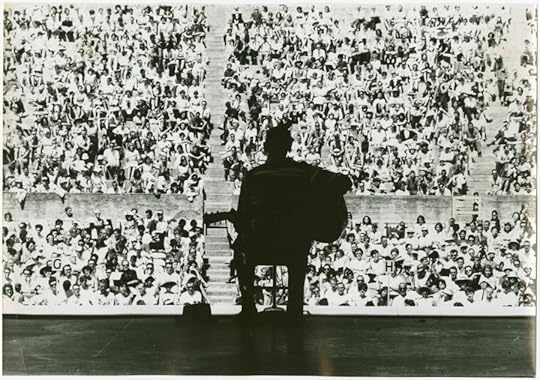 Mance Lipcomb @ Berkeley Folk Music Festival, Greek Theater, University of California, 1963.
Mance Lipcomb @ Berkeley Folk Music Festival, Greek Theater, University of California, 1963.On Saturday, 14 October 2022, 4pm EDT, I will be presenting a talk, “Mance Lipscomb’s Silhouette: Region, Race, Expertise, and Digitization at the Berkeley Folk Music Festival Project,” at the Curating for Change: The Work that Music Festivals Do in the World Virtual Conference co-organized by the International Institute for Critical Studies in Improvisation at the University of Guelph and the Department of History at Queen’s University, with the support of sponsors and partners from across Canada. The two-part conference looks to be a wonderful virtual gathering. To register, visit the Eventbrite page: whatmusicfestivalsdo.eventbrite.com.
July 31, 2022
Rovings
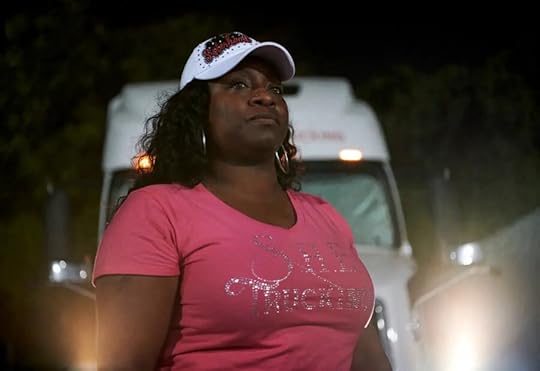 Anne-Marie Michel, Tiffany Hana, 43, Dallas, Texas, from the book
Sisters of the Road
. SoundsSouled American, “Before Tonight”Stole From The Throat Of A Bird: The Complete Recordings Of Ed & Ella HaleyRoscoe Mitchell, NTS Radio, 11 July 2022Belle and Sebastian, The Life PursuitJoan Shelley, SpurWadada Leo Smith, String Quartets Nos. 1-12The A’s, FruitMountain Man, Made the HarborMountain Man, Magic ShipDaughter of Swords, DawnbreakerLos Tigres del Norte, “El Coyote”Chris Strachwitz, 1964 Interview on KPFA?, part of the article Deep Dives: Chris’s 91st Birthday, Arhoolie FoundationNatural Information Society featuring Evan Parker, decension (Out Of Our Constrictions)Mansfield Park, BBC SoundsCamille, BBC SoundsThe Ballad of Johnny Longstaff, BBC SoundsMarvel’s Wastelanders: Wolverine podcast Season 01WordsRaymond Foye, “Delineators: Jordan Belson and Harry Smith,” Gagosian Quarterly, Spring 2021Mee-Lai Stone, “In it for the long haul: female truckers in the US – in pictures,” The Guardian, 13 July 2022, featuring photographs by Anne-Marie Michel in the book Sisters of the RoadToni Morrison, The Bluest EyeHilton Als, Douglas Fogle, and Helen Molesworth, Catherine OpieDevon Powers, “The problem of popular culture,” Communication Theory, July 2022 Helene Stapinski, “Where Is Pete Panto?,” New York Times, 9 July 2022Jessica Ferber and Marc Myers, Rebirth of the Cool: Discovering the Art of Robert James CampbellCarlos Albuquerque, “Interview: Gilberto Gil at 80: ‘Bolsonaro has a retrograde worldview, an opposition to any advance’,” The Guardian, 22 July 2022“Walls”Winslow Homer, Crosscurrents @ The Metropolitan Museum of ArtDesigning Peace @ Cooper HewittFrédéric Bruly Bouabré: World Unbound @ MoMAYoan Capote, Requiem @ Jack Shainman GalleryIn Practice: Literally means collapse @ Sculpture CenterKatharina Grosse, Destroy Me Once, Destroy Me Twice @ Roskilde Festival, DenmarkArt and Race Matters, The Career of Robert Colescott @ New MuseumAbraham Cruzvillegas, éclat @ Les Tanneries, Centre d’art contemporain, Amilly, France B. Ingrid Olson, History Mother, Little Sister @ Carpenter Center for the Visual ArtsVirginia Overton @ Goldsmiths CCADave Muller, Sunset, Sunrise (repeat) b/w The Record Pavilion @ Blum & Poe Los Angeles“Stages”Joni Mitchell, “Just Like This Train” (electric guitar solo) @ Newport Folk Festival, 24 July 2022Belle and Sebastian @ Live at KEXP, 22 June 2022Quarantine Concerts: Damon Locks & Macie Stewart @ Experimental Sound Studio, 6 December 2020Olivia Block & Julia Holter: Whenever the Breeze @ May Chapel at Rosehill Cemetery, 2 June 2018The Wire 40 x ESS Streaming Festival Day 01The Wire 40 x ESS Streaming Festival Day 02Cat Mahari, CoMISSION @ Links Hall, 25 June 2022ScreensWhose Song Is This?A Tribute to Gary Snyder, Library of America, 20 July 2022Mortu Nega (Those Whom Death Refused)Udju Azul Di Yonta (The Blue Eyes of Yonta)Borgen Season 04 (Power and Glory)Allied
All Hands On Deck
Anne-Marie Michel, Tiffany Hana, 43, Dallas, Texas, from the book
Sisters of the Road
. SoundsSouled American, “Before Tonight”Stole From The Throat Of A Bird: The Complete Recordings Of Ed & Ella HaleyRoscoe Mitchell, NTS Radio, 11 July 2022Belle and Sebastian, The Life PursuitJoan Shelley, SpurWadada Leo Smith, String Quartets Nos. 1-12The A’s, FruitMountain Man, Made the HarborMountain Man, Magic ShipDaughter of Swords, DawnbreakerLos Tigres del Norte, “El Coyote”Chris Strachwitz, 1964 Interview on KPFA?, part of the article Deep Dives: Chris’s 91st Birthday, Arhoolie FoundationNatural Information Society featuring Evan Parker, decension (Out Of Our Constrictions)Mansfield Park, BBC SoundsCamille, BBC SoundsThe Ballad of Johnny Longstaff, BBC SoundsMarvel’s Wastelanders: Wolverine podcast Season 01WordsRaymond Foye, “Delineators: Jordan Belson and Harry Smith,” Gagosian Quarterly, Spring 2021Mee-Lai Stone, “In it for the long haul: female truckers in the US – in pictures,” The Guardian, 13 July 2022, featuring photographs by Anne-Marie Michel in the book Sisters of the RoadToni Morrison, The Bluest EyeHilton Als, Douglas Fogle, and Helen Molesworth, Catherine OpieDevon Powers, “The problem of popular culture,” Communication Theory, July 2022 Helene Stapinski, “Where Is Pete Panto?,” New York Times, 9 July 2022Jessica Ferber and Marc Myers, Rebirth of the Cool: Discovering the Art of Robert James CampbellCarlos Albuquerque, “Interview: Gilberto Gil at 80: ‘Bolsonaro has a retrograde worldview, an opposition to any advance’,” The Guardian, 22 July 2022“Walls”Winslow Homer, Crosscurrents @ The Metropolitan Museum of ArtDesigning Peace @ Cooper HewittFrédéric Bruly Bouabré: World Unbound @ MoMAYoan Capote, Requiem @ Jack Shainman GalleryIn Practice: Literally means collapse @ Sculpture CenterKatharina Grosse, Destroy Me Once, Destroy Me Twice @ Roskilde Festival, DenmarkArt and Race Matters, The Career of Robert Colescott @ New MuseumAbraham Cruzvillegas, éclat @ Les Tanneries, Centre d’art contemporain, Amilly, France B. Ingrid Olson, History Mother, Little Sister @ Carpenter Center for the Visual ArtsVirginia Overton @ Goldsmiths CCADave Muller, Sunset, Sunrise (repeat) b/w The Record Pavilion @ Blum & Poe Los Angeles“Stages”Joni Mitchell, “Just Like This Train” (electric guitar solo) @ Newport Folk Festival, 24 July 2022Belle and Sebastian @ Live at KEXP, 22 June 2022Quarantine Concerts: Damon Locks & Macie Stewart @ Experimental Sound Studio, 6 December 2020Olivia Block & Julia Holter: Whenever the Breeze @ May Chapel at Rosehill Cemetery, 2 June 2018The Wire 40 x ESS Streaming Festival Day 01The Wire 40 x ESS Streaming Festival Day 02Cat Mahari, CoMISSION @ Links Hall, 25 June 2022ScreensWhose Song Is This?A Tribute to Gary Snyder, Library of America, 20 July 2022Mortu Nega (Those Whom Death Refused)Udju Azul Di Yonta (The Blue Eyes of Yonta)Borgen Season 04 (Power and Glory)Allied
All Hands On Deck
Infinite Series of Parallelograms
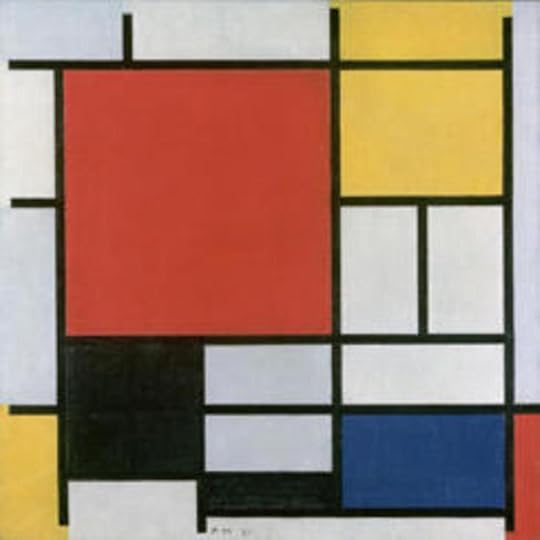 Piet Mondrian, Composition with Large Red Plane, Yellow, Black, Gray and Blue (1921).
Piet Mondrian, Composition with Large Red Plane, Yellow, Black, Gray and Blue (1921).…history is made in such a way that the final result always arises from conflicts between many individual wills, of which each in turn has been made what it is by a host of particular conditions of life. Thus there are innumerable intersecting forces, an infinite series of parallelograms of forces which give rise to one resultant—the historical event.
— Friedrich Engels



